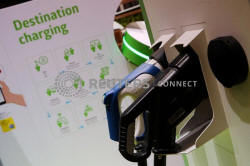|
Ionity, which is not yet profitable, aims to install the 400
charging stations by the end of next year, with each having
about 6 individual loading spots. It has so far installed 63
stations, with a further 52 under construction.
The group specializes in ultra high-speed charging along
European motorways to try to address the issue of range, which
along with price, is still seen as a reason for why demand for
electric vehicles has been subdued so far.
"There's a lot of momentum, activity will be high," Ionity Chief
Executive Michael Hajesch told reporters late on Wednesday. "The
expansion plans are currently being prepared," he added.
This could include more and bigger charging stations along
highways but also busy roads leading in and out of larger
metropolitan areas where demand for charging infrastructure is
highest, Hajesch said.
He said that competition in the electric vehicle charging
infrastructure space, where players range from oil majors and
engineering conglomerates to utilities and carmakers, would
increase further in coming years.
Earlier this year, Shell acquired U.S.-based Greenlots,
following its acquisition of NewMotion in 2017, which has
established the oil group as one of the largest players in the
field.
The International Energy Agency estimates that the number of
electric cars on the road will increase to 125 million by 2030,
boosting demand for chargers. There were almost 3 million
private chargers at homes and workplaces and about 430,000
public chargers in 2017, according to IEA estimates.
(Reporting by Ilona Wissenbach; writing by Christoph Steitz.
Editing by Jane Merriman)
[© 2019 Thomson Reuters. All rights
reserved.] Copyright 2019 Reuters. All rights reserved. This material may not be published,
broadcast, rewritten or redistributed.
Thompson Reuters is solely responsible for this content.

|
|





